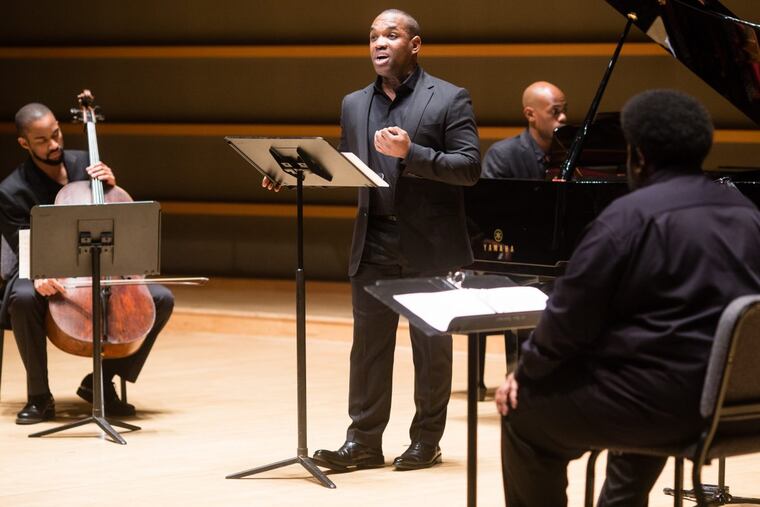In world premiere, looking in the mirror with Opera Philadelphia's Lawrence Brownlee
In "Cycles of My Being," the tenor tells us what he sees, and what America sees.

A movement from a Brahms violin sonata opened the concert, and then an excerpt from the Barber cello sonata led into some spirituals. From there, a new song cycle explored how the world experiences the black man and vice versa.
If it sounds discursive, it was. And yet it held together, in part because of an emotional arc whose tension rose and fell over 90 minutes. Tuesday's evening of chamber music at the Perelman Theater was the most visible product so far from Lawrence Brownlee, Opera Philadelphia's newish artistic advisor, and it felt like an event that may have artistic implications for how the company defines its audience — and itself.
Brownlee, of course, is known mostly as a tenor, a bel canto specialist whose Rossini and Donizetti thrill with a sense of ease and lightness. No such material here. In the premiere of this work, Cycles of My Being by composer Tyshawn Sorey and poet Terrance Hayes, Brownlee repurposed his remarkably solid middle-high tessitura to angst-ridden ends. It was more Britten than Bellini.
America – I hear you hiss and stare
Do you love the air in me, as I love the air in you?
Scored for piano, violin, cello, clarinet, and voice, and conducted by the composer seated within the ensemble, the work looks at the black male experience in six movements chronicling elements of hate and hope in the lives of black men. Distinct grades of despair stream by: somber and rattled in the first movement, which opens with the lines above, with violin and cello chiming in, plaintive and concerned. Hope is unpacked in the second movement in all its various guises, but Brownlee's high, tense sound lets us know how tenuous it all is. The piano wields daggers in "Whirlwind," and in "Hate," when Brownlee speaks rather than sings, it packs a punch: "You don't know me. Still you hate me."
The emotional intensity of the evening was shaped to a greater purpose. The first movement of Brahms' Sonata for Violin and Piano No. 2 is woven mostly of green-spring tendrils and joy, and with pianist Kevin J. Miller, violinist Randall Mitsuo Goosby caught and suspended its sweetest moment, a delayed high note near the end. Cellist Khari Joyner and Miller took the mood to a more brooding place in the first movement of Barber's Sonata for Cello and Piano, Opus 6. Clarinetist Alexander Laing explained the musical diaspora of the spiritual into the American concert hall, and, again with Miller, he played three, including an especially touching "Balm in Gilead" arranged by Victor Labenske.
>> Read more: Lawrence Brownlee's 'Cycles of My Being': 'Hold on to your seats'
Cycles of My Being went farther into despair than anything before it and covered more complex emotional ground. After icy bleakness that seems to suspend time, the last movement — "Each Day I Rise, I Know" — is reassuring in its quotidian talk of a morning glow and looking in the mirror as the day starts. The dissonance melts away and momentum takes over, like tumbling into the sunlight.
And then the piece ends suddenly and quietly. Here is an existential question delivered in a small moment, and the sensation of a larger meaning coming into focus with a musical gesture felt startlingly familiar.
It was like Schubert. But of now, and us.